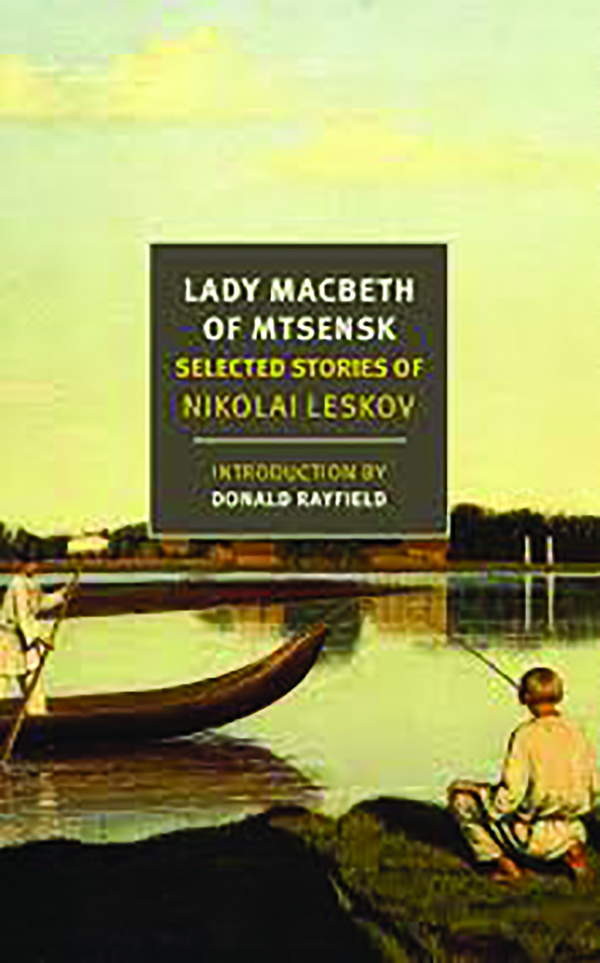In the course of lecturing on Russian literature at Cornell in 1958, Vladimir Nabokov made it clear to his students that he considered Leo Tolstoy and Fyodor Dostoevsky night and day in terms of quality. The former was simply “the greatest Russian writer of prose fiction,” while the latter was a sentimentalist hack “whose gallery of characters consists almost exclusively of neurotics and lunatics.” Nabokov’s caustic contrarianism aside, no one disputes that these are the two giants of 19th-century Russian prose, with Ivan Turgenev a distant third.

By comparison, Nikolai Leskov, a contemporary of all three, is barely known in the West. Although Nabokov included him in his Cornell lectures, the notes have not survived. If Leskov comes up at all today, it is usually as the author of the adultery- and murder-filled short story “Lady Macbeth of Mtsensk,” known more as the source material for the Dmitri Shostakovich opera of the same name than as a literary work in its own right. That is a shame, for Leskov is a writer of singular narrative power and a voice unlike any other in the canon. In publishing a volume of six of Leskov’s stories that span the length of his career, NYRB Classics has done English-language readers a great service.
Part of the reason for Leskov’s neglect is how distinct his writing is from that of his peers. He defies easy categorization, and as any good marketer will tell you, ambiguity about the nature of a product will leave consumers wary. Fairly or unfairly, Dostoyevsky and Tolstoy are lumped together as novelists of psychological realism. Leskov, in contrast, never felt at home in the novel as a form: Most of his great works are shorter, hovering in length somewhere between novella and short story. Moreover, there is no “psychological realism” to be found in his works — neither Dostoevskian passages of spiritual anguish nor Tolstoyan ones on man’s warped perceptions of the historical process. Leskov’s narratives are much simpler, and in this simplicity lies their power. As his biographer Hugh McLean put it, from his first story, Leskov “discovered the effectiveness of tension between the stated fact and the unstated reaction.”
On one level, Leskov’s simplicity of description resembles the style of Anton Chekhov. Both had provincial upbringings far removed from Moscow and St. Petersburg society, lending an air of authenticity to their portrayals of country life not found in other Russian writers. Both also felt most at home in forms shorter than the novel. And yet, a psychological abyss separates even these two otherwise similar writers. Chekhov wrote stories the way Thelonious Monk played the piano: What he left out was just as important as what he put in. His prose may have been sparse, but the subtleties of his descriptions convey clear if indirect hints about the psychology of a character or some great tragedy left off the page. In Leskov, by contrast, the absence of any explicit insight is simply that. There is no psychological there there, just pure narrative craftsmanship. This complete lack of mental context or explanation is what led the cultural critic Walter Benjamin to identify Leskov’s work as one of the last modern vestiges of a dying art: storytelling in its original form.
Benjamin believed that the power of storytelling was inexorably bound up with the oral tradition, the directness of which was lost with the dawn of the novel and the age of mass information that followed it. For him, “there is nothing that commends a story to memory more effectively than that chaste compactness which precludes psychological analysis” because this quality means “it is left up to [the reader] to interpret things the way he understands them, and thus the narrative achieves an amplitude that [mere] information lacks.” Benjamin saw this phenomenon in Leskov’s works and, with it, a direct line to the oral and epic literary traditions that had all but died out in the age of industry.
In Russian, this kind of narrative has its own tradition and even its own term: “skaz.” Although difficult to translate exactly, skaz is a style of folk storytelling in which the narration, plot, and characterization are all tuned to the voice of the narrator. Leskov’s stories often employ this technique through the use of layered narrative, starting with an encounter between the narrator proper and a particular character, who then proceeds to tell the story that makes up the meat of the work.
Executing the skaz technique demands absolute linguistic precision, which means careful translation is necessary for English-language readers to appreciate it. Fortunately, this volume delivers on that front, especially in the four of the six stories newly rendered into English by the great Slavist and Chekhov biographer Donald Rayfield. The only comparable Leskov anthology on the market is one done by Richard Pevear and Larissa Volokhonsky, a pair whose painfully literal, inconsistent, and often tone-deaf translations continue to be hailed as masterpieces by too many in the literary world.
“Lady Macbeth” may be Leskov’s most famous work, but the highlight of this volume is “The Enchanted Wanderer,” a 130-plus page traverse that follows its title character through rural estates, Tatar camps on the steppe, Gypsy music halls, and remote monasteries. As the wanderer finishes his chronicle by foreseeing war on the horizon, the narrator proper concludes the tale:
Looked at with fresh eyes, this passage as well as any hints at the secret of Leskov’s prose, the power of which lies in shunning the psychological dimensions of the wise and the prudent in favor of a language capable of conjuring all the vividness and mystery of childhood.
Nat Brown is a former deputy web editor of Foreign Affairs and a former deputy managing editor of National Review Online.
